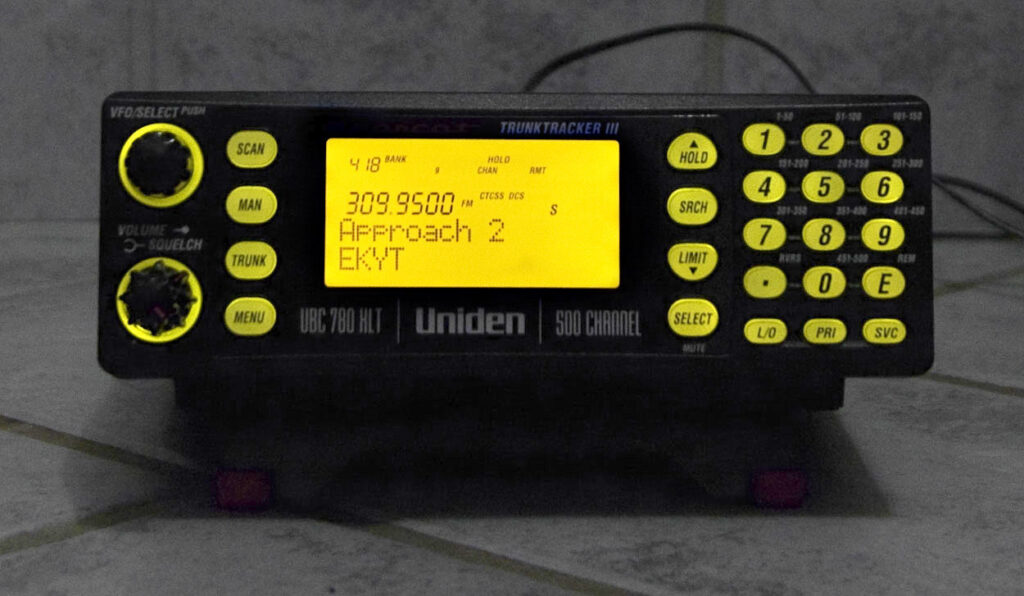By Jeffrey A. Roberts
CFOIC Executive Director
The death at age 89 of longtime police reporter Marilyn Robinson brought to mind an enduring image for those of us who were colleagues of hers at The Denver Post — an image perfectly described in an obituary written earlier this month by another former colleague, Bruce Finley.
“She worked mostly in the newsroom beneath towering stacks of old newspapers and her notes, making countless calls to dispatchers, desk sergeants and frontline officers from the old landline telephones, sometimes with a phone on each ear, sustaining herself on coffee, Pepsi, popcorn and yogurt,” Finley recalled. “Robinson simultaneously monitored chatter from police radio scanners.”
The radio scanners were vital tools of Robinson’s trade, tipping her off to police activities throughout the Denver metro area — information she corroborated by making those countless calls to her many, many sources.

But they wouldn’t be so useful if Robinson were still reporting today.
As we’ve previously written, the Denver Police Department fully encrypted its radio communications in 2019 and the Aurora Police Department went silent three years earlier, moves they said were necessary to protect officer safety and tactical decisions and to prevent the public release of people’s personal information.
Recently the Colorado Freedom of Information Coalition learned that the Aurora PD, when Art Acevedo was interim chief, considered reinstating a public feed of radio transmissions — with a 10-minute delay — through the Broadcastify mobile app. The delay would have alleviated “a lot, but not all, of our internal concerns about officer safety, tactical decisions, etc.,” Joe Moylan, the department’s public information officer, told CFOIC in an emailed response to our questions.
But Broadcastify doesn’t provide a way to protect witness and victim information that might be transmitted over the radio to the public, he added. Ultimately scuttling the project was the 2023 enactment of legislation that requires the deletion of all names and identifying information of juvenile victims and witnesses from police and court records.
“We have a moral and ethical obligation to protect victim and witness privacy,” Moylan wrote. “We take that very seriously and even while we were considering the Broadcastify option, there were significant concerns among leadership about how we would continue to protect victims and witnesses.”
“Those concerns were further heightened when Senate Bill 23-075 was introduced and ultimately passed, which now legally requires us to not only protect the privacy rights of juvenile criminal offenders, but also juvenile witnesses to crimes. Those new legal requirements apply to all public records, including dispatch radio traffic, and there’s no way for us to redact that information in real time.”
(Note: Both Acevedo and Aurora Mayor Mike Coffman testified in favor of SB 23-075 during a February 2023 Senate Judiciary Committee hearing.)
Since 2021, a state law has required each Colorado law enforcement agency that encrypts all of its radio transmissions to create a “communications access policy” for letting local news media outlets listen to primary dispatch channels “through commercially available radio receivers, scanners, or other feasible technology.”
Aurora PD has such a policy but “none of our local media organizations have taken advantage of this offer,” Moylan confirmed. In a 2022 article, CFOIC reported on the reason why: The policy requires news outlets to sign an agreement indemnifying Aurora PD and the city of Aurora “from and against all claims, damages, liabilities, losses, and expenses, direct, indirect or consequential arising out of or resulting from” the agreement.
Denver PD’s proposed agreement includes an additional sticking point for news organizations, a clause giving the city auditor or any agent of the city “the right to access and the right to examine any directly pertinent books, documents, papers and records of” the news organization.
The Aurora and Denver departments are two of many agencies around the state that have encrypted their dispatch communications. For a forthcoming paper commissioned by the Colorado Broadcasters Association, a University of Denver Sturm College of Law student submitted requests to 59 departments for records about their compliance with the 2021 state law requiring access policies for news media. Only six, including Aurora and Denver, responded with records. Each agreement provided to the law student includes an indemnification clause that many journalists have been reluctant to sign because of the potential financial risks.
A few law enforcement agencies, such as the Colorado Springs Police Department, have reached agreements with local newsrooms to provide radio access, and some still have public dispatch feeds. For example, the public can listen to Boulder Police Department communications on Broadcastify.
Moylan told CFOIC that Aurora PD rejected a proposal from news organizations to have officers switch to an encrypted channel before airing sensitive information. “This is an unreasonable expectation and places an unnecessary burden on our officers, particularly when they are responding to and/or in the early stages of investigating a ‘hot’ call or violent crime,” he wrote.
Aurora PD knows that “the vast majority” of journalists vet information they hear on scanners before reporting it, Moylan added. “However, Broadcastify would be open to everyone. There is no mechanism that exists that would allow us to uphold our moral, and now legal, obligation to protect victim, witness and juvenile privacy rights while also providing the media and the public with the access to radio traffic they desire.”
Follow the Colorado Freedom of Information Coalition on X (formerly Twitter) @CoFOIC. Like CFOIC’s Facebook page. Do you appreciate the information and resources provided by CFOIC? Please consider making a tax-deductible donation.




